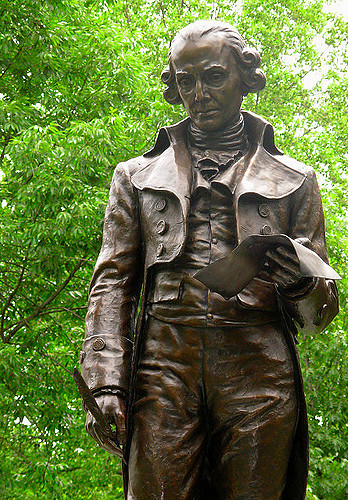Wars are won and lost by words
“Whoever controls the language, controls the culture.” (Dennis Peacocke)
“So great is my veneration for the Bible that the earlier my children begin to read it, the more confident will be my hope that they will prove useful citizens of their country.” (John Q. Adams, 6th U.S. President)

“I believe no man was ever early instructed in the truths of the Bible without having been made wiser or better by the early operation of these impressions upon his mind.” (Benjamin Rush, “Defence of the Use of the Bible in Schools,” 1791, Signer of the Declaration of Independence, Physician and Scientist)
The Bible teaches us that words are spirit. Jesus Christ, the Incarnate Word, said, “My words are spirit and they are life” (John 6:63). Words are the very substance or building blocks of ideas, and ideas have consequences! Word meanings inspire ideas that direct the pathway of our thinking and reasoning which lead to choices and consequences! Mastering and communicating with a biblical vocabulary is a high priority for Christian leaders, teachers, and parents. Satan has used the strategy of de-Christianizing America’s education by removing the knowledge of the living God and His Word from the heart of education. He has revised history to erase the remembrance of God’s Hand in the lives of men and nations. He has eradicated Godly standards and the biblical vocabulary, imagery, and ideals from our language. Because most of us have been educated in the world’s system through the philosophy of humanism, we are blind to these facts and need to be renewed.
The 21st Century Battle is a Battle of Words
The battle in the twenty-first century is a spiritual and cultural battle for the hearts and minds of the next generation waged in the classroom and in the media with words! It is a war of ideas and requires spiritual weapons with which to wage it! Understanding the strategy used by Satan to de-Christianize education by removing the knowledge of the living God and His Word from the heart of education, by revising history to erase the remembrance of God’s Hand in the lives of men and nations, and by eradicating Godly standards and the biblical vocabulary, imagery, and ideals from language and communication will help Christian leaders, teachers and parents to be alert and take action to be armed with effective weapons of warfare. Most of us have been educated in the world’s system through the philosophy of humanism and are blind to these facts.
It is a grievous fact that even many theological seminaries and Bible colleges teach from a secular philosophy of education. There may be pockets within the curriculum that are biblical, however, the worldview of most instructors, certainly the textbooks that they use, and the methods they employ to teach are progressive and humanistic. Students do not graduate with a renewed mind or supernatural faith.
 By and large, our colleges and universities worldwide espouse humanism, as well. Professors seek acceptance by other scholars based on common-ground presuppositions. These presuppositions are always humanistic, for they assert the existence of authoritative standards apart from God and a confession of supernatural faith. This is a declaration of the existence of an independent truth higher than that of the Bible. Therefore, most Christians have a dualistic mindset. They separate their secular life from their spiritual life. Sunday is God’s day and Monday through Saturday they spend thinking the world’s way, solving problems the world’s way, doing business the world’s way, and teaching and learning the world’s way.
By and large, our colleges and universities worldwide espouse humanism, as well. Professors seek acceptance by other scholars based on common-ground presuppositions. These presuppositions are always humanistic, for they assert the existence of authoritative standards apart from God and a confession of supernatural faith. This is a declaration of the existence of an independent truth higher than that of the Bible. Therefore, most Christians have a dualistic mindset. They separate their secular life from their spiritual life. Sunday is God’s day and Monday through Saturday they spend thinking the world’s way, solving problems the world’s way, doing business the world’s way, and teaching and learning the world’s way.
The Bible has profound things to teach us, but many believers have no idea about what is said in Scripture as it relates to academia. Western civilization has a history of having taught the revelation of the Bible and having taught students how to reason with the revelation of God’s Word. This affected thought, vocabulary usage, and literature. This has been lost today in Christian education. Few are able to think Christianly, articulate and defend a Christian worldview in the marketplace or persuade others to believe it! While many pursue materialistic goals in education, the enemy has subtly stolen our Christian educational heritage. Our vocabulary has been stripped of biblical imagery and ideals. We have lost the ideals of truth and beauty in our thought life and speech, and our reasoning has become secular. Allan Bloom’s book (1988), The Closing of the American Mind, began with this disturbing statement: “There is one thing a professor can be absolutely certain of: almost every student entering the university believes, or says he believes, that truth is relative.” With the truth and beauty of God’s Word removed from the heart of our educational system, Americans are losing the war!
The Emphasis on the Visual Image rather than the Written Word in Our Culture
Today the enemy has lured our children away from enjoying the written word through the overuse of the visual image. Think of the hours a day that we Americans and our children sit passively watching visual images in movies, television programs, cartoons, videos, computers, the internet, video games, and computer courses. The written word has been abandoned for the visual image. Scientists now find that the brain is developing differently physiologically! How has the emphasis on the visual image rather than the written word impacted the ability of this generation to clothe ideas with words and effectively articulate thoughts? God obviously values the written and the spoken word. He spoke the creation of the universe into being, “In the beginning, God said . . .” (Genesis 1). God revealed Himself through the written Word and the Incarnate Word, Jesus Christ! “In the beginning was the Word, and the Word was with God and the Word was God” (John 1:1).
A Lesson from Plato’s “Simile of the Cave”
In E. Christian Kopff’s The Devil Knows Latin (1999), he wrote about Book VII in Plato’s Republic which began with the great “Simile of the Cave”:
 According to Plato, the Athenians of his day resembled men sitting in a dark cave, staring at a wall onto which other men, by holding up images in front of a fire, project shadows. The people sitting in the cave think that the reflections on the wall are reality. But one day a man gets up from his seat and turns around. He sees that the reflections are the creations of the people holding up the images. He goes outside and sees the real world and the sun, the source of both life and of knowledge. That is what Plato thought his contemporaries were like. And this is what we have become. We sit in a dark room, watching screens on which play reflections of images manipulated by people we do not see, and we take those reflections for reality. I remember as a teenager, when a local store caught on fire. A large crowd gathered to watch. Then about 11:00 p.m. the crowd disappeared. I found out later that they had gone home to watch the fire on television. That, not their own experience, was reality for them. I was surprised. (Frankly I was shocked!) Plato would not have been. (pp. 311-12)
According to Plato, the Athenians of his day resembled men sitting in a dark cave, staring at a wall onto which other men, by holding up images in front of a fire, project shadows. The people sitting in the cave think that the reflections on the wall are reality. But one day a man gets up from his seat and turns around. He sees that the reflections are the creations of the people holding up the images. He goes outside and sees the real world and the sun, the source of both life and of knowledge. That is what Plato thought his contemporaries were like. And this is what we have become. We sit in a dark room, watching screens on which play reflections of images manipulated by people we do not see, and we take those reflections for reality. I remember as a teenager, when a local store caught on fire. A large crowd gathered to watch. Then about 11:00 p.m. the crowd disappeared. I found out later that they had gone home to watch the fire on television. That, not their own experience, was reality for them. I was surprised. (Frankly I was shocked!) Plato would not have been. (pp. 311-12)
The lesson we can derive as Christians from Plato’s “Simile of the Cave” is that God’s Word is the source of light needed at the heart of teaching and learning, not the visual image, not the secular humanist’s perception of reality! Reality is found in relationship with Jesus Christ and His Word, the Bible. Kopff notes that “the decision to move from the easy delivery of the visual image to the written word involves effort and perhaps pain, because the sunlight will be too bright for our minds. We will also not receive much encouragement from the others sitting in the cave. Getting into the sun does not bring you money or position in life. It does bring you, however, a quality of life you can’t find elsewhere!”
Thy word is a lamp unto my feet and a light unto my path (Psalm 119:105).
The unfolding of Thy word gives light. It gives understanding to the simple (Psalm 119:130).
For the commandment is a lamp, and the teaching is light . . . (Proverbs 6:23).
- Elizabeth Youmans
… to be continued






